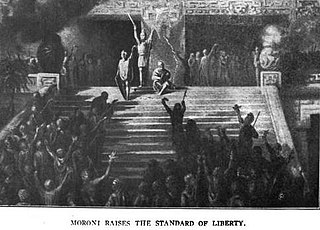
The Book of Alma: The Son of Alma, usually referred to as the Book of Alma, is one of the books that make up the Book of Mormon. The title refers to Alma the Younger, a prophet and "chief judge" of the Nephites. Alma is the longest book in the Book of Mormon and consists of sixty-three chapters, taking up almost a third of the volume.

The Book of Mormon is a religious text of the Latter Day Saint movement, first published in 1830 by Joseph Smith as The Book of Mormon: An Account Written by the Hand of Mormon upon Plates Taken from the Plates of Nephi.

The Standard Works of the Church of Jesus Christ of Latter-day Saints are the four books that currently constitute its open scriptural canon. The four books of the standard works are:

The Book of Mormon mentions three men named Helaman. The first was the son of King Benjamin, king of the united Nephite-Zarahemla kingdom who lived in the 2nd century BC. Besides his genealogy, information about the first Helaman is limited. His brother, Mosiah, became heir to the throne.
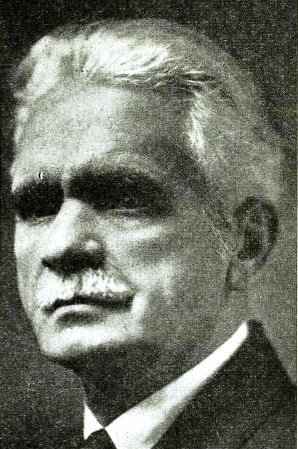
Brigham Henry Roberts was a historian, politician, and leader in the Church of Jesus Christ of Latter-day Saints. He edited the seven-volume History of the Church of Jesus Christ of Latter-day Saints and independently wrote the six-volume Comprehensive History of the Church of Jesus Christ of Latter-day Saints. Roberts also wrote Studies of the Book of Mormon—published posthumously—which discussed the validity of the Book of Mormon as an ancient record. Roberts was denied a seat as a member of United States Congress because of his practice of polygamy.
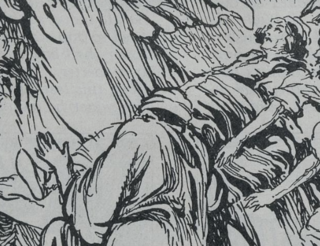
In the Book of Mormon, Alma, the son of Alma is a Nephite prophet often referred to as Alma the Younger to distinguish him from his father, who is often referred to as Alma the Elder. These appellations, "the Younger" and "the Elder," are not used in the Book of Mormon; they are distinctions made by scholars, useful because both individuals were prominent during the same time period in the Book of Mormon's story and filled a similar cultural and religious role. Alma is the namesake of the Book of Alma.

Mormon cinema usually refers to films with themes relevant to members of the Church of Jesus Christ of Latter-day Saints. The term has also been used to refer to films that do not necessarily reflect Mormon themes but have been made by Mormon filmmakers. Films within the realm of Mormon cinema may be distinguished from institutional films produced by the LDS Church, such as Legacy and Testaments, which are made for instructional or proselyting purposes and are non-commercial. Mormon cinema is produced mainly for the purposes of entertainment and potential financial success.

The Folk of the Fringe (1989) is a collection of post-apocalyptic stories by American writer Orson Scott Card. These stories are set sometime in the near future, when World War III has left America in ruins. The stories are about how a few groups of Mormons struggle to survive. Although all of these stories in this book were meant to stand alone, they each include at least one character from one of the other stories which helps to make them a cohesive collection.

Adherents to the Latter Day Saint movement view the Book of Mormon as a work of divinely inspired scripture, which was written by ancient prophets in the ancient Americas. Most adherents believe Joseph Smith's account of translating ancient golden plates inscribed by prophets. Smith preached that the angel Moroni, a prophet in the Book of Mormon, directed him in the 1820s to a hill near his home in Palmyra, New York, where the plates were buried. An often repeated and upheld as convincing claim by adherents that the story is true is that besides Smith himself, there were at least 11 witnesses who said they saw the plates in 1829, three that claimed to also have been visited by an angel, and other witnesses who observed Smith dictating parts of the text that eventually became the Book of Mormon.

Janet Kay Jensen is an American author. She was born April 3, 1951, in Berkeley, California. She earned the following degrees: B.S.Utah State University and M.A. Northwestern University. Jensen resides in northern Utah.
The AML Awards are given annually by the Association for Mormon Letters (AML) to the best work "by, for, and about Mormons." They are juried awards, chosen by a panel of judges. Citations for many of the awards can be found on the AML website.

The standard works of Mormonism—the largest denomination of which is the Church of Jesus Christ of Latter-day Saints —have been the subject of various criticisms. Latter-day Saints believe the Book of Mormon is a sacred text with the same divine authority as the Bible; both are considered complementary to each other. Other Mormon sacred texts include the Pearl of Great Price and Doctrine and Covenants, which are also recognized as scripture. Religious and scholarly critics outside Mormonism have disputed Mormonism's unique scriptures, questioning the traditional narrative of how these books came to light and the extent to which they describe actual events. Critics cite research in history, archeology, and other disciplines to support their contentions.

Lawrence Dallin "Dal" Clawson was a cinematographer in the United States who founded the American Society of Cinematographers.
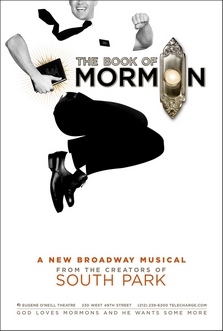
The Book of Mormon is a musical comedy with music, lyrics, and book by Trey Parker, Robert Lopez, and Matt Stone. The story follows two missionaries of the Church of Jesus Christ of Latter-day Saints as they attempt to preach the faith to the inhabitants of a remote Ugandan village. The earnest young men are challenged by the lack of interest from the locals, who are distracted by more pressing issues such as HIV/AIDS, famine, female genital mutilation, child molestation, and oppression by the local warlord.

Corianton: A Story of Unholy Love is a 1931 American drama film based on the story of Corianton, the son of the prophet Alma in the Book of Mormon. Corianton appears only briefly in three passages in the Book of Mormon. However, as scholars Randy Astle and Gideon Burton point out, his story is one of the only stories in the Book of Mormon "with any sex in it", which has made it a popular subject of Book of Mormon-themed fiction and drama for more than a century.

Orestes Utah Bean (1873–1937) was an American playwright. Bean was born in Provo, Utah to George Washington Bean. He was a Latter-day Saint.
Ardis E. Parshall is an "independent historian" who researches Latter-day Saint history. Parshall has published her research on her blog, Keepapitchinin. In addition to her research work, Parshall worked for the Salt Lake Tribune as a historical writer from 2005 to 2011. She also published a book entitled, The Corianton Saga. Parshall has co-edited books including Mormonism: A Historical Encyclopedia and Dime Novel Mormons.

Christian universalism was a theology prevalent in the early United States coinciding with the founding of the Latter Day Saint movement in 1830. Universalists believed that God would save all of humanity. Universalism peaked in popularity during the 1820s and 1830s, and the idea of universal salvation for all humanity was hotly debated. Several revelations of the founder of the Latter Day Saint movement, Joseph Smith, dealt with issues regarding Universalism, and it was a prominent heresy in the Book of Mormon. Smith's father was a Universalist, while his mother was a traditional Calvinist, creating strain in the Smith family home.
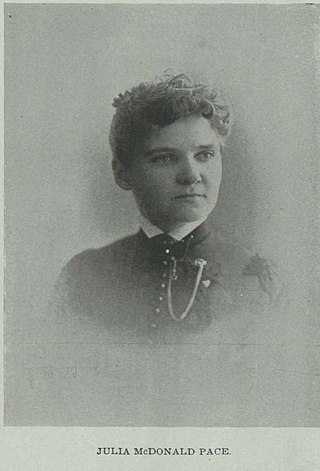
Julia Ann Ivins McDonaldPace, who wrote under the name Julia McDonald, was a scholar, medical student and writer who was born in Utah Territory in 1859. She was a members of The Church of Jesus Christ of Latter-day Saints and was part of the Mormon Home literature movement in the late 19th and early 20th centuries. She is best known as the author of the novel A Ship of Hagoth (1896), which was adapted in two stage plays and the 1931 motion picture Corianton: A Story of Unholy Love.















